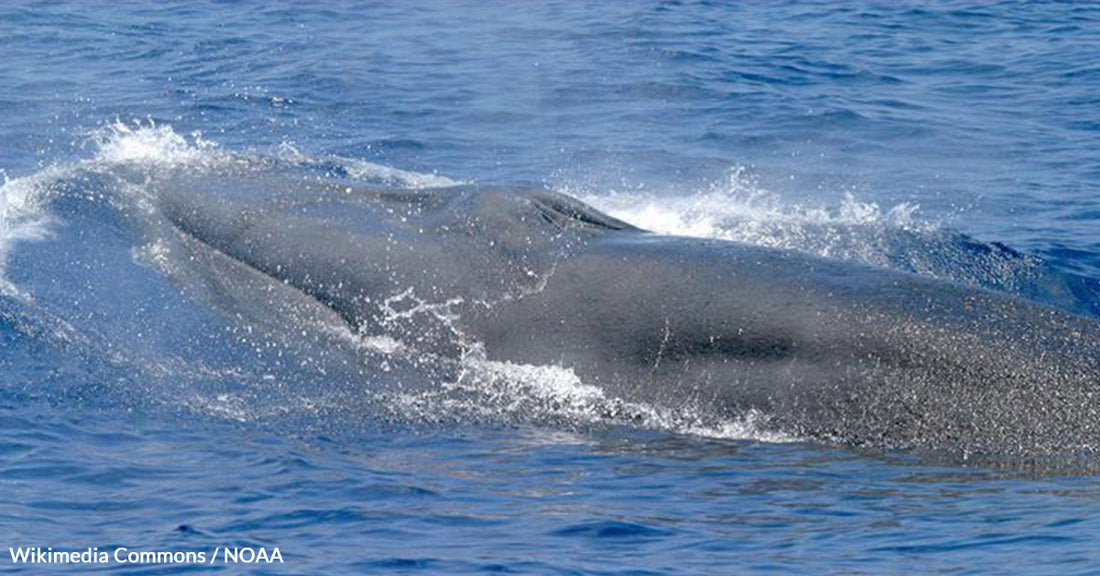Rice's Whale Faces Imminent Extinction as Population Dwindles to 51
Matthew Russell
Rice's whale, a newly identified species in the Gulf of Mexico, stands at the precipice of extinction with an estimated population of just 51 individuals.
These baleen whales, unique to the northern Gulf, face a barrage of human-induced threats that jeopardize their existence.
 Photo: Wikimedia Commons / NOAA Fisheries, License: Public Domain
Photo: Wikimedia Commons / NOAA Fisheries, License: Public DomainRice's whale was recognized as a distinct species in 2021.
A Newly Discovered Endangered Species
Rice's whale, initially mistaken for a Bryde's whale subspecies, was identified as a distinct species in 2021. This recognition was crucial but came with the sobering reality of its endangered status.
As NPR reports, the species is named after marine biologist Dale Rice, and exhibits unique characteristics distinguishing it from other Bryde's whales globally.
 Photo: Wikimedia Commons / National Marine Fisheries Service Southeast Fisheries Science Center, License: Public Domain
Photo: Wikimedia Commons / National Marine Fisheries Service Southeast Fisheries Science Center, License: Public DomainVessel strikes are a major threat to Rice's whales.
Human activities pose a significant risk to Rice's whales. Vessel strikes, seismic airgun blasts for oil and gas exploration, and environmental contamination are primary threats. The devastating 2010 Gulf oil spill, according to National Geographic, significantly impacted their population, killing an estimated 17% and causing reproductive issues in nearly a quarter of the surviving females.
Conservation Efforts and Challenges
Efforts to save Rice's whales have been met with challenges. Despite their endangered status and the urgency of their situation, there have been delays in implementing protective measures.
According to the Marine Mammal Commission, the U.S. government's slow response in protecting Rice's whales has drawn criticism and legal actions from conservation groups. Despite being listed as endangered, the designation of critical habitat and a recovery plan have been delayed, hindering effective conservation efforts.
 Photo: Wikimedia Commons / National Marine Fisheries Service Southeast Fisheries Science Center, License: Public Domain
Photo: Wikimedia Commons / National Marine Fisheries Service Southeast Fisheries Science Center, License: Public DomainRice's whales are the only resident baleen whales in the northern Gulf.
A proposal to impose speed limits on vessels to reduce ship strikes was denied by NOAA, citing other conservation priorities. As NPR reports, this decision, despite evidence supporting the effectiveness of speed limits in protecting endangered whales, highlights the complex interplay between conservation needs and economic considerations.
The Sound of Survival
Rice's whales rely heavily on their unique vocalizations for survival, which are threatened by underwater noise pollution, reports the National Oceanic and Atmospheric Administration. Seismic airgun blasts and fast-moving ship propellers create a cacophony that interferes with their communication and navigation. This noise pollution is a significant but often overlooked threat.
The Road Ahead
Rice's whales face a critical juncture. Without immediate and effective conservation action, their extinction could be the first man-made extinction of a great whale species. The species' plight reflects broader environmental and bureaucratic challenges in balancing economic interests with the urgent need to protect our planet's biodiversity.
 Photo: Wikimedia Commons / NOAA, License: Public Domain
Photo: Wikimedia Commons / NOAA, License: Public DomainRice's whales are vulnerable to climate change impacts.
The survival of Rice's whales is more than just the fate of a single species; it's a litmus test for our commitment to preserving Earth's rich marine life.
As we grapple with the challenges of conservation in the face of human development, the story of Rice's whale serves as a reminder of the delicate balance we must maintain to ensure a thriving, diverse world for future generations.
Click below to take a stand for whales!

